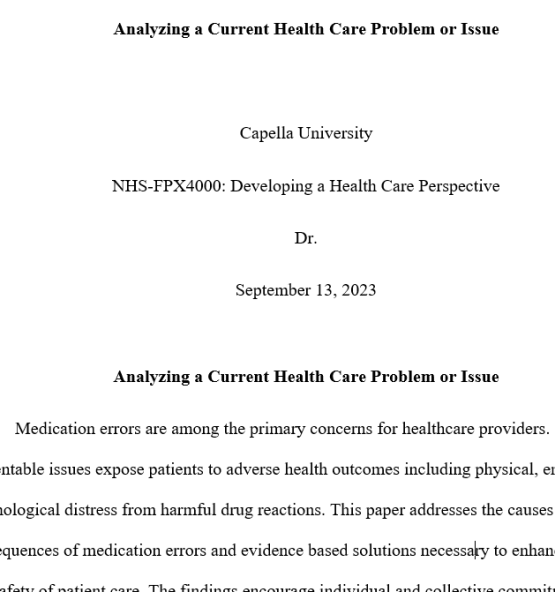
Analyzing a Current Health Care Problem or Issue
Capella University
NHS-FPX4000: Developing a Health Care Perspective
Dr.
September 13, 2023
Availability:In Stock
Medication errors expose patients and organizations to adverse outcomes such as severe complications, prolonged hospitalization, additional costs, and premature deaths. The negative consequences remind healthcare professionals about their obligation towards monitoring, identifying, and intercepting risks associated with medication errors. The issue also calls for interdisciplinary collaboration to increase vigilance and initiate safety improvement plans appropriate for enhancing the quality and safety of patient care.
Medication errors are among the most reported incidents in the healthcare system. The issue attracts attention from patients, families, the healthcare team, regulators, and other stakeholders responsible for ensuring consistent safety and quality of patient care. Marufu et al. (2022) defined medication errors as preventable outcomes caused by inappropriate medication preparation and administration and have the potential of causing patient harm. Repeated errors raise questions about the level of training, education, and adhering patient safety culture (Marufu et al., 2022). The other causes of medication errors include inadequate staffing, failure to embrace double-checking, limited knowledge on handling high-alert medications, and interruptions within the medication preparation or administration room.
Successful outcomes depend on nurses’ adherence to the rights of safe medication administration. The rights include the right time and drug in the right dose and by the right route. For this paper, a case that happened at Dorn VA Medical Center in South Carolina will provide insights into the causes, consequences, and solutions for medication errors. In the incident, a nurse repeatedly administered doses of pegfilgtastim instead of filgrastim (Sneed, 2019). The patient developed pulmonary toxicity, which escalated to severe acute lung injury and death. The case also resulted in $800,000 settlement, which showed the high cost of medication errors.
The identified scenario captures patient’s vulnerability to wrong medication administration, severe complications, and premature deaths. A common reason for the error was the similar sounding medications that caused a selection mistake. In this case, the similar sounding drug names make it challenging for nurses, physicians, and pharmacists to ensure safe, correct, and effective administration of medications (Martyn et al., 2019). The incidence also revealed nurse negligence associated with failure to read warning signs, confirm a patient’s medication needs, and adhere to policies and procedures on safe medication administration. The negligent nurses are vulnerable to interruptions and disruptions from unrelated activities such as communicating with colleagues when preparing or administering medications.
Inadequate oversight is another challenge that jeopardizes ability to identify and intercept errors. The gap means that leaders such as nurse managers do not provide adequate instructions and follow-ups. Leaders fail to ensure adequate knowledge of high-alert medications and consistent adherence to policies, procedures, and practice standards (Martyn et al., 2019). Ethically, medication errors from administrative and human-related weaknesses highlight non-adherence to the principles of non-maleficence, beneficence, autonomy, and justice (Rizalar & Baltaci, 2020). For instance, negligence means reduced willingness to serve patient interests and prevent emotional, physical, and psychological harm from medication errors. Similarly, patients require adequate explanation of events leading to a medication errors and interventions adopted to prevent similar outcomes in the future.
Reviews
There are no reviews yet.